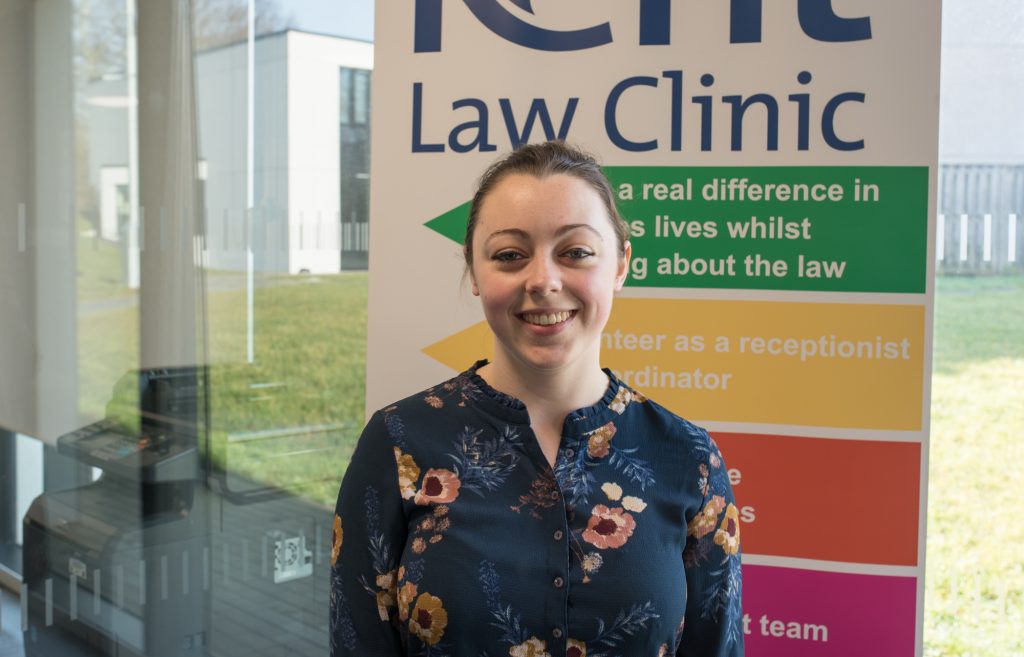Kent Law Clinic student Esther McNamara has helped a client and her son secure upto £22,000 in benefits arrears following a successful Personal Independence Payment (PIP) appeal at a First Tier Tribunal on Monday.
Esther, who is a final-year European Legal Studies student, had no previous experience of welfare benefits prior to taking on the case earlier this term under the supervision of Law Clinic Director Graham Tegg. Within a month, Esther familiarised herself with PIP legislation and looked into the Upper Tribunal case law on PIP. She also conducted interviews with the client to establish additional information and evidence in support of the case.
At the hearing, the Department for Work and Pensions (DWP) continued to defend their decision that the client had scored zero points and was entitled to no award of PIP at all. However, Graham and Esther successfully persuaded the Tribunal to award their client the enhanced rate of PIP for both the ‘Daily Living’ and ‘Mobility’ components of PIP. The client will receive the benefits she should have received from May 2017 to May 2020, totalling close to £22,000 – a combination of PIP and an increase in the premiums awarded for the severely disabled entitled to Employment and Support Allowance (ESA). She will also receive an increase in weekly benefit income of approximately £155.00 per week from now on.
Graham and Esther said it was a spectacular result. Esther said: ‘Our client and her son were both extremely brave and presented themselves clearly and honestly, in the face of personal questions about our client’s condition.’
Graham applauded Esther’s competent handling of the case: ‘These cases are difficult and often distressing. Esther was able to form a rapport with the client and conducted interviews with great sensitivity.’
He added: ‘There’s something wrong, very wrong. How can it be possible that a person with severe and multiple health problems be awarded zero points and, more than a year and a half later, be accepted as qualifying for the highest award of PIP? Our client lost her motability car and lived on a severely reduced income for all that time.’
Esther summarised the key case details as follows:
Our client suffers from many long-standing health problems. She has frequent contact with several different medical professionals and her medical history is extensive. She was receiving Disability Living Allowance (DLA) for several years, and these benefits assisted with her living costs and the upkeep of an adapted mobility car.
Once her previous award of DLA expired, the client was invited for a new assessment to assess her entitlement to Personal Independence Payments (PIP). The Department for Work and Pensions (DWP) was phasing out DLA and making the transition to PIP.
The new PIP system comprised of two different ‘categories’ of disability; the first is Daily Living activities, and the second is Mobility. Claimants can access benefits for one or both of these, at a standard or an enhanced rate of payment. In order to obtain either mobility or daily living benefits, claimants must score a certain number of points in either the Daily Living or Mobility component. The more help, supervision, or assistance a person needs with each activity, the more points they score. There are ten activities (or ‘descriptors’) in the Daily Living category, and two for Mobility.
At first, the client is required to fill out a ‘How Your Disability Affects You’ form as part of their claim for PIP. Our client and her family completed this form without any legal assistance.
The client’s physical assessment for eligibility for PIP took place in the summer of 2017. She was assessed by a private firm who are contracted to assess claimants and pass on information to the DWP, who then make the decision. Despite being unable to walk without the assistance of a stick and relying heavily upon the use of a mobility scooter, the client was awarded zero points for mobility. Despite having many adaptations in her home and relying heavily upon assistance from her adult children to perform everyday tasks, the client was awarded zero points for daily living.
Having received no points for mobility, she was unable to keep her adapted mobility car and her disability benefits were stopped. The same result was reached at the Mandatory Reconsideration made by the DWP; all refused claimants are entitled to a reconsideration of the DWP’s first decision.
The client lived without disability benefits for two years. She approached the Clinic for assistance with the forthcoming Tribunal. The purpose of the Tribunal is to assess that decision made by the DWP in the summer of 2017, and to correct it if necessary. The Clinic was able to assist the client with preparing thorough, evidence-based answers to the questions she would be asked at the Tribunal. It was important that she spoke about her condition as it was in the summer of 2017.

